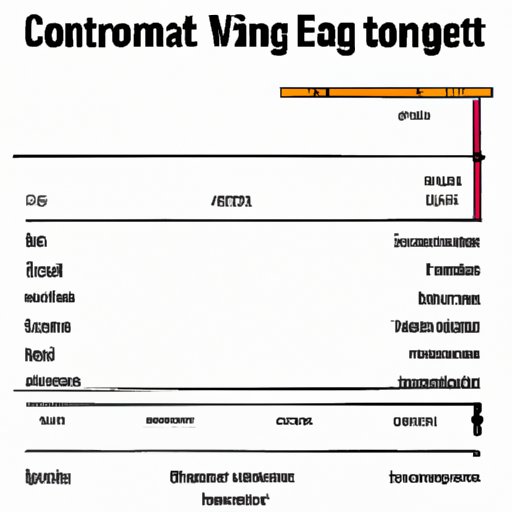Introduction
If you’re considering writing a book, one of the first questions that comes to mind is “how long should it be?” Determining the appropriate book length for your story can be tricky. There are no hard and fast rules, but there are some guidelines and considerations that can help you make the right decision for your project. In this article, we’ll explore popular book lengths and why they work, tips for choosing the right length for your story, balancing word count with plot depth, applying genre-specific guidelines to book length, and knowing when to make exceptions to the rule.
Analyzing Popular Book Lengths and Why They Work
When considering book length, it’s helpful to look at examples of what has already been done. Popular books come in many shapes and sizes, from short stories to novels, and everything in between. Here’s a quick overview of some of the most common types of books and their typical word counts:
- Short stories: 1,000–7,500 words
- Novellas: 7,500–40,000 words
- Novels: 40,000–110,000 words
- Epics: 110,000+ words
It’s important to note that these are just rough estimates. Some books may be slightly shorter or longer than the average, depending on the story and the author’s preference. But these word counts provide a good starting point for determining the length of your book.
One of the benefits of following the standard conventions for book length is that it makes it easier for readers to find your book. For example, if you write a novel that falls within the typical range of 40,000–110,000 words, it will be easier for readers to find because they’ll know what to expect when they pick up your book. It’s also helpful to consider the marketability of your book when deciding on its length. Shorter books tend to be more appealing to publishers because they’re cheaper to produce and faster to read. Longer books, on the other hand, may require more effort to read and may not be as profitable for publishers.

Tips for Choosing the Right Length for Your Story
When determining the length of your book, there are a few key factors to consider. First, think about your target audience. Are you writing for children or adults? Young adults or older adults? Knowing who your audience is will help you decide on an appropriate length for your book. If you’re writing for children, for example, you may want to keep your book shorter so it’s not too intimidating for younger readers.
The format of your book is also important. Are you writing a physical book or an ebook? Ebooks are typically shorter than physical books because they’re easier to read on screens. It’s also important to consider the genre of your book. Different genres have different expectations for book length. For example, romance novels tend to be shorter than fantasy novels because they focus more on character development and relationships than world building and plot.

Balancing Word Count with Plot Depth
Once you’ve decided on the length of your book, it’s important to ensure that the word count is balanced with the depth of your plot. For example, if you’re writing a short story, you’ll need to make sure that the plot is concise and focused on one main event or conflict. On the other hand, if you’re writing a novel, you’ll need to include enough detail and subplots so that the story feels complete and satisfying to the reader.
It’s also important to allow for character development. Even if your book is on the shorter side, you should still give your characters time to grow and evolve throughout the story. This will help keep readers engaged and invested in your characters’ journeys.
Finally, it’s important to avoid unnecessary detail. If you’re writing a longer book, it can be tempting to include every little detail, but this can quickly become overwhelming for readers. Stick to the essentials and focus on making each scene as interesting and engaging as possible.
Applying Genre-Specific Guidelines to Book Length
Different genres have different expectations for book length. It’s important to research the conventions for the genre you’re writing in order to ensure that your book will meet industry standards. Here’s a quick overview of some of the most popular genres and their typical word counts:
- Mystery/Thriller: 80,000–100,000 words
- Romance: 70,000–90,000 words
- Fantasy/Sci-Fi: 90,000–120,000 words
- Historical Fiction: 80,000–100,000 words
- Memoir: 60,000–90,000 words
Again, these are just rough estimates. Some books may be slightly shorter or longer than the averages, depending on the story and the author’s preference. But using these guidelines as a starting point can help you determine the appropriate length for your book.

Knowing When to Make Exceptions to the Rule
At the end of the day, the length of your book is ultimately up to you. While it’s important to consider the conventions of your genre and the expectations of your audience, it’s also important to remember that you have creative freedom. If you feel strongly about a certain book length, don’t be afraid to make exceptions to the rule. Just make sure that your choice is strategic and intentional.
For example, if you’re writing a novel that’s significantly longer than the conventional word count, you may want to consider breaking it into multiple volumes. This will make it easier for readers to digest and will also make it more appealing to publishers. Similarly, if you’re writing a short story that’s significantly shorter than the average, you may want to consider releasing it as part of a collection or anthology.
Conclusion
Choosing the right book length for your story can be a difficult decision. But by considering popular book lengths and why they work, understanding tips for choosing the right length for your story, balancing word count with plot depth, applying genre-specific guidelines to book length, and knowing when to make exceptions to the rule, you can make an informed decision that’s right for your story and your audience.
(Note: Is this article not meeting your expectations? Do you have knowledge or insights to share? Unlock new opportunities and expand your reach by joining our authors team. Click Registration to join us and share your expertise with our readers.)
